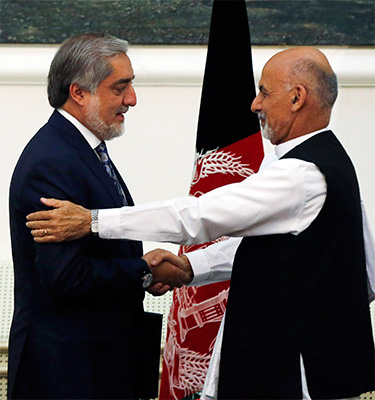Rift between Ghani, Abdullah threatens Afghan 'unity government'
September 06, 2016 20:36

Two years after a contentious, fraud-marred presidential election pushed Afghanistan to the brink of another bloody civil war, the country is once again staring into the abyss.
The compromise power deal signed by political rivals Ashraf Ghani and Abdullah Abdullah to avert that crisis expires at the end of this month, threatening to upend the beleaguered South Asian state's governing order with no clear alternative at hand, Radio Liberty said.
The so-called national unity government effectively installing President Ghani and Chief Executive Abdullah in September 2014 was a temporary solution to pave the way for an overhaul of the political system within two years.
But as the United States-brokered deal nears its conclusion, Afghanistan's leadership has failed to live up to many of its commitments under the agreement. By now, Afghanistan was meant to hold parliamentary elections, push through sweeping electoral reforms, and amend the 2004 constitution to create the position of prime minister.
The impasse has led to an escalating feud between Ghani and Abdullah, rising tensions among the country's long-warring ethnic groups and factions, and mounting calls from a vocal opposition for the dissolution of the government.
Read more.
The compromise power deal signed by political rivals Ashraf Ghani and Abdullah Abdullah to avert that crisis expires at the end of this month, threatening to upend the beleaguered South Asian state's governing order with no clear alternative at hand, Radio Liberty said.
The so-called national unity government effectively installing President Ghani and Chief Executive Abdullah in September 2014 was a temporary solution to pave the way for an overhaul of the political system within two years.
But as the United States-brokered deal nears its conclusion, Afghanistan's leadership has failed to live up to many of its commitments under the agreement. By now, Afghanistan was meant to hold parliamentary elections, push through sweeping electoral reforms, and amend the 2004 constitution to create the position of prime minister.
The impasse has led to an escalating feud between Ghani and Abdullah, rising tensions among the country's long-warring ethnic groups and factions, and mounting calls from a vocal opposition for the dissolution of the government.
Read more.





 © 2024 Rediff.com -
© 2024 Rediff.com -